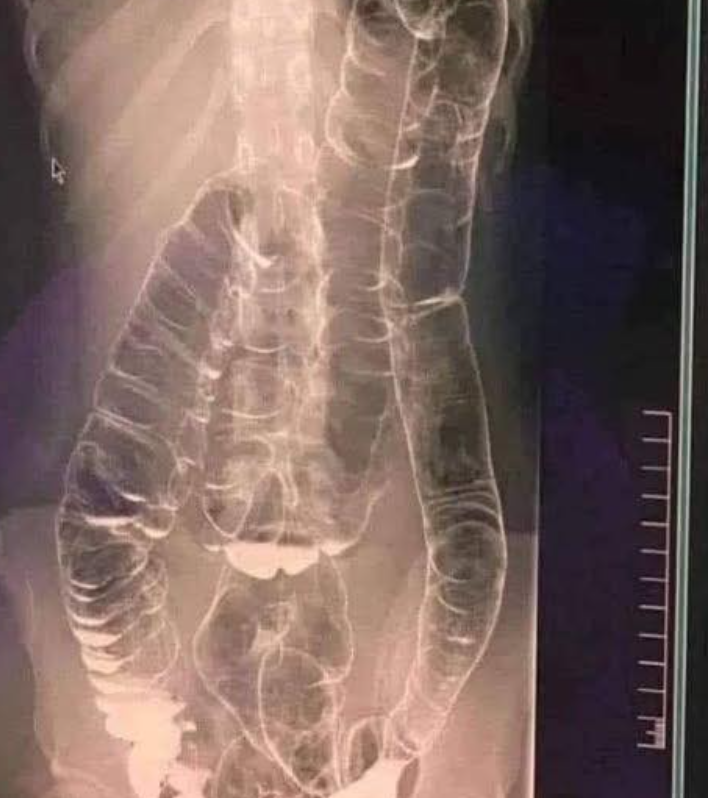The Hidden Dangers of Chronic Constipation: Why Ignoring It Can Be Life-Threatening
While constipation might seem like a minor inconvenience, neglecting it for prolonged periods can lead to serious health complications. A compelling real-life case highlights just how dangerous chronic constipation can be and underscores the importance of taking it seriously.
A young woman suffered from years of persistent constipation. Her condition worsened dramatically when she went more than two weeks without a bowel movement. Concerned about her deteriorating symptoms, she finally sought medical help, only to receive alarming news.
When waste accumulates in the colon due to sluggish digestion, it causes discomfort, bloating, and abdominal pain. Over time, the colon can become severely distended as it struggles to contain the excessive fecal buildup. In this case, medical imaging revealed a dramatically enlarged colon that extended all the way up toward her chest, dangerously close to her heart. The stretching had nearly flattened the colon’s natural folds and wrinkles, which are vital for its proper function. If left untreated, this condition could have resulted in life-threatening complications.
The Risks of Severe Colon Distension
One of the most dangerous effects of chronic constipation is severe colon distension. When the colon becomes overstretched, its ability to contract and propel waste diminishes, making bowel movements even more difficult. This creates a vicious cycle—waste remains in the body longer, causing further stretching and worsening the problem.
Toxin Buildup and Systemic Effects
Prolonged stool retention can also lead to toxin buildup. Harmful bacteria and waste products can be reabsorbed into the bloodstream, potentially causing symptoms like fatigue, bad breath, bloating, acne, and a weakened immune system.
Painful and Potentially Dangerous Conditions
Chronic constipation can cause painful conditions such as hemorrhoids and anal fissures. Straining to pass hardened stool increases pressure on rectal veins, leading to swollen, bleeding hemorrhoids. In some cases, tiny tears called anal fissures develop, causing sharp pain during bowel movements.
A more severe danger is bowel obstruction, where impacted stool blocks the intestines entirely. This can cut off blood flow, leading to tissue death (necrosis), infection, and the need for emergency surgery to remove damaged sections of the bowel.
Link to Colorectal Cancer
Research suggests that long-term constipation may increase the risk of colorectal cancer. The prolonged presence of waste in the colon exposes it to carcinogenic compounds, fostering chronic inflammation and abnormal cell growth.
Preventive Measures and Lifestyle Changes
Fortunately, constipation can often be prevented or managed effectively through simple lifestyle modifications:
- Increase Fiber Intake: Incorporate more whole grains, nuts, seeds, fruits, and vegetables. Natural laxatives like prunes, apples, pears, flaxseeds, and chia seeds promote regular bowel movements.
- Stay Hydrated: Drinking 2-3 liters (8-12 cups) of water daily helps soften stools, facilitating easier passage. Warm lemon water in the morning can also aid digestion.
- Exercise Regularly: Physical activity stimulates intestinal function. Aim for at least 15-30 minutes of walking, yoga, or stretching each day.
- Establish a Routine: Develop a consistent bathroom schedule, ideally after meals, to encourage regularity. Ignoring the urge to defecate can worsen constipation.
- Limit Processed and Low-Fiber Foods: Reduce intake of red meat, dairy, fried foods, fast food, and refined carbs like white bread and pastries, which slow digestion and produce harder stools.
Natural Remedies and When to Seek Medical Help
Herbal teas such as peppermint, fennel, or ginger can aid digestion. Supplements like magnesium and aloe vera juice may also help regulate bowel movements.
If constipation persists beyond a few days, or if you experience severe bloating, vomiting, blood in stool, or intense pain, it’s crucial to consult a healthcare professional. Persistent symptoms could indicate more serious conditions requiring medical intervention.
The Bottom Line
Ignoring constipation may seem harmless at first, but it can evolve into a serious health threat. Proactive lifestyle choices—such as maintaining a high-fiber diet, staying hydrated, exercising, and listening to your body’s signals—are key to preventing complications. Recognizing and addressing constipation early can safeguard your digestive health and overall well-being.




